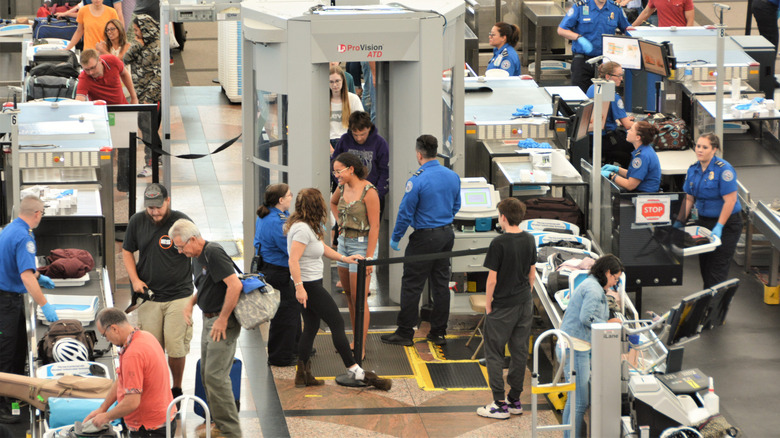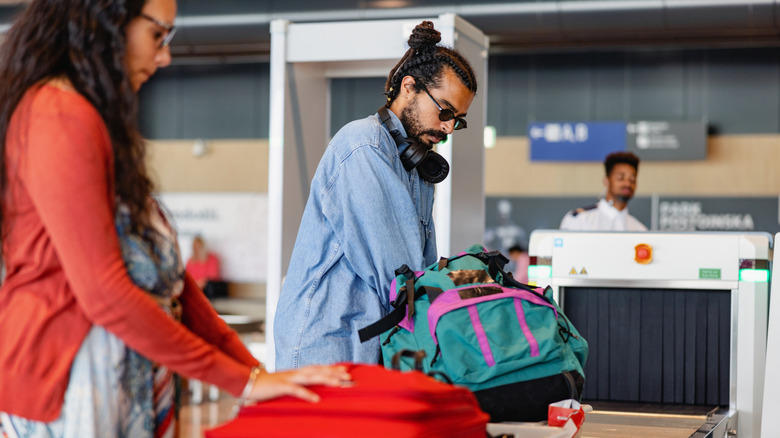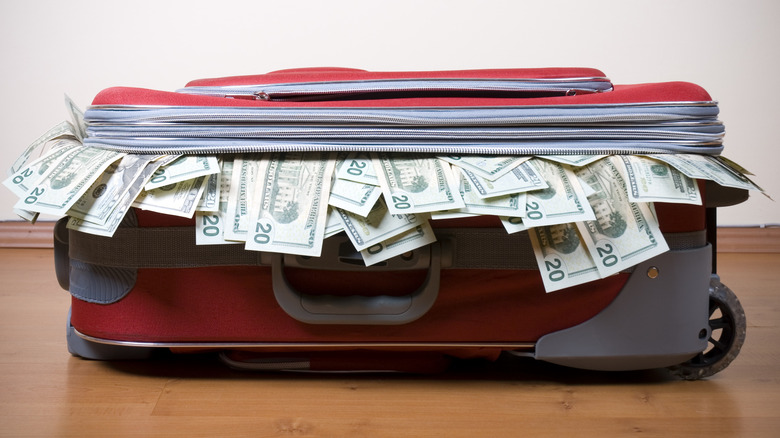Why You Should Think Twice Before Bringing Large Sums Of Cash Through TSA
Many American travelers believe that airport security does make travel safer. According to an online U.S. News and World Report survey from December 2021, 79% of Americans believed that security should be prioritized to keep the traveling public safe. However, during security screenings over the past decade, there have been several instances where travelers have had large sums of money, expensive watches, and electronic devices stolen right in front of CCTV cameras. Sadly, it's not just travelers picking up freebies. Occasionally, TSA officers also steal items and money from the checkpoints and out of checked luggage, with some guilty officers even blaming the agency for their crimes.
Some of the most brazen cases have involved TSA officers stealing money from travelers' possessions as they've passed through security. In one instance, a TSA officer stole $600 directly from a traveler's wallet at Miami International Airport, while another officer in Orlando stole money from a woman's bag and put it directly into his pocket while she received a pat down. TSA officers who inspect checked luggage have also been caught with sticky fingers. Per the New York Daily News, a former officer who worked at Newark Liberty admitted to taking over $800,000 from travelers over four years, including a camera from CNN.
In the United States, the TSA is required by law to inspect all travelers and all luggage on commercial aircraft to add an additional layer of security to keep the traveling public safe. Even though TSA officers go through a long hiring process, including a thorough background check, looking through checked luggage with multiple officers and CCTV cameras, and undergoing recurring background checks while working for the agency, there are still a few bad apples. Remember to protect your passport at the airport too!
How to protect yourself in security
You may only be separated from your items for just a moment while waiting for a patdown or a family with children to put their shoes on. However, a few seconds and a hiccup in the screening process is all it takes for a criminal to stuff a wad of cash, jewelry, or a small item into their pocket and walk away. Between the time you show your ID to the agent and walk through the metal detectors, take a moment to put your cash, wallet, and loose accessories inside your carry-on bag, preferably in a zippered compartment. Make a mental note of how many bins you have passing through and walk behind your luggage after placing it on the conveyor. As you pass through the metal detector, be sure to keep an eye on your items, especially if you are required to undergo a patdown. Then, once you are reunited with your luggage, count your bins, grab your items, and catch your flight.
Signing up for a program such as TSA PreCheck is one of the best ways to cut stress and save time in airport security lines. PreCheck members can leave all liquids, gels, and electronics in their bags, keep their shoes and clothing on, and normally wait less than 10 minutes in line at security checkpoints.
If you do fly with an expensive electronic item, valuable jewelry, or a large sum of money, write a packing list and photograph your belongings in your suitcase. Should worse come to worst, you will be able to show the police, the airline, and TSA some evidence of what went missing when you file reports. And, if you purchased the item with a credit card, it may be eligible for purchase protection if it was stolen.
Flying with big money
Whether you're headed to the airport for an extended vacation, sold everything and are starting over, or are on your way home after hitting the jackpot in Vegas, you can legally stuff your carry-on bags and wallets full of money with no legal limits, pass through TSA, and fly anywhere. That being said, as TSA's job is to screen luggage and passengers for security threats, they will be on the lookout for suspicious behavior, such as being chatty, and this boarding pass code which signals for a deeper search. If the officer finds a lot of money in your carry-on or checked bag, they may call law enforcement to investigate as TSA only screens passengers and luggage.
If you are traveling with large amounts of money, be aware that civil forfeiture laws and anti-money laundering policies from the Department of Justice ruined many innocent travelers' trips — and even lives. Until November 2024, the DEA paid airport workers to flag passengers who fit the profile of cash couriers: last-minute flights to drug-trafficking hubs such as New York or an intercontinental flight with a quick turnaround. Federal Agents would question and search the traveler and commonly seized large amounts of cash over $5,000. This is despite the United States having no requirement to declare cash moving domestically and illegal search and seizures being conducted without a warrant, yet the travelers must fight in court to get their money back.
If you are traveling internationally to or from the U.S. and have over $10,000 in cash and monetary instruments, do not forget to declare it. Either file a FinCen105 form online before leaving or entering the country or fill out a hard copy with CBP at the airport to ensure your money is not seized and you are not penalized or prosecuted by Uncle Sam.


